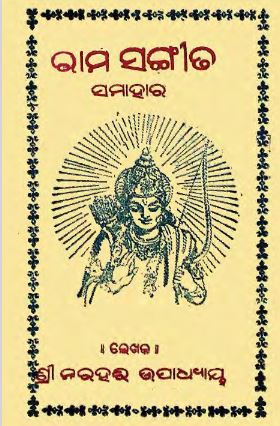Rama Sangita Samahar, Adya Kalika, authored by Narahari Upadhyay and published in 1975, is a compelling anthology of Odia devotional poems. This poetic collection intricately weaves together the spiritual essence of Lord Rama, Hindu mythology, and the power of devotion, encapsulated in a harmonious blend of lyrical beauty and profound wisdom.
The anthology derives its thematic depth from two primary sources of inspiration: the epic tales and divine attributes of Lord Rama and the metaphysical concept of Adya Kalika, often interpreted as the primordial energy or the great goddess Kali. Through this confluence, Upadhyay addresses the duality of existence – the serene righteousness of Lord Rama and the fierce, transformative energy of Adya Kalika.
Primarily, the poems celebrate the virtues, valor, and divinity of Lord Rama, revered as the seventh avatar of Vishnu and the protagonist of the ancient Indian epic, the Ramayana. Each verse delves into various episodes of his life, from his birth in Ayodhya to his conquest over the demon king Ravana, symbolizing the triumph of good over evil. The narrative voice encapsulates the ethos of Rama – an epitome of dharma (righteousness), compassion, and ideal kingship. Through these recountings, Upadhyay invites devotees to partake in the bhakti (devotional worship) of Lord Rama, encouraging readers to internalize his divine qualities.
The spiritual journey is further enriched by the invocation of Adya Kalika. In doing so, Upadhyay acknowledges the feminine divine energy, portraying it as a complement to the masculine presence of Rama. Kali’s dynamic and transformative essence adds a layer of spiritual introspection, urging devotees to recognize and revere the integral balance of the universe. The poems dedicated to Adya Kalika explore themes of creation, destruction, and renewal, depicted through vivid imagery and symbolic references. This duality and synergy reflect the holistic vision of spirituality prevalent in Hinduism, where the divine feminine and masculine are seen as complementary forces.
One of the striking features of “Rama Sangita Samahar, Adya Kalika” is its linguistic finesse and lyrical elegance. Upadhyay employs a rich tapestry of Odia language, imbuing each poem with cultural authenticity and emotional resonance. The rhythmic cadences and alliterative patterns enhance the devotional atmosphere, making the recitations melodious and deeply engaging. The choice of words, metaphors, and similes establish a profound connection between the reader and the divine subject.
Sub-poems within the anthology act as microcosms of larger spiritual narratives, allowing readers to dive into individual aspects of Rama and Kalika’s mythology. Each sub-poem stands as a testament to Upadhyay’s literary prowess, revealing layers of spiritual significance through concise yet powerful verses. These sub-poems also serve as meditative texts, offering moments for personal reflection and spiritual communion.
Moreover, “Rama Sangita Samahar, Adya Kalika” is not merely an anthology but a deeply personal testament to Upadhyay’s own spiritual journey. His devotion and reverence shine through each line, making the book an intimate dialogue between the poet, the divine, and the reader. His nuanced understanding of Hindu doctrine, combined with his poetic flair, ensures that each poem resonates with authenticity and devotion.
In essence, “Rama Sangita Samahar, Adya Kalika” by Narahari Upadhyay is a timeless treasure of Odia literature. It transcends mere poetic expression to become a spiritual guide, inviting readers to embark on an inner journey of devotion and self-realization. Through the harmonious blend of worshiping Lord Rama and Adya Kalika, the anthology presents a rich tapestry of divine love, courage, and transcendental wisdom.
Books Info
| Books name | Rama Sangita Samahar, Adya Kalika |
| Editor | Narahari Upaddhyay |
| No Of pages | 26 |
| Publisher | NA |
| Publication | 1975 |
| Printed At | NA |
| Distributor | NA |

